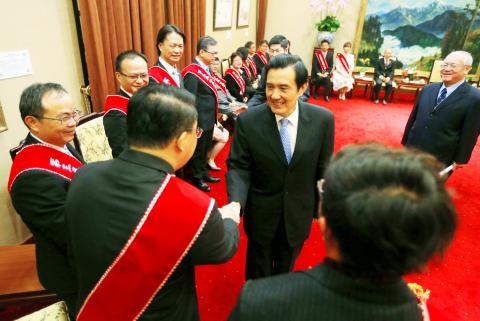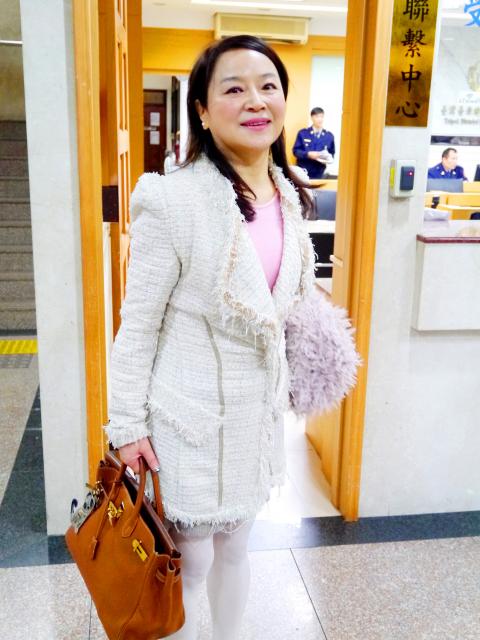Allegations that President Ma Ying-jeou (馬英九) and his campaign team received an off-the-books political donation from Ting Hsin International Group (頂新集團) continued yesterday as media personality Clara Chou (周玉蔻), in a new revelation, accused the Ma administration of being Ting Hsin’s gatekeeper and identifying Ma himself as the person who had received a NT$200 million (US$6.34 million) donation from the company.
Chou said Ma had received the secret donation from Ting Hsin through a confidant and took it to be within legal boundaries for campaign fund-raising.
He might have thought that as the money was used solely for campaign activities and did not end up in his pocket, it was not corruption, Chou said, but added that the move showed seriously flawed moral integrity.

Photo: CNA
Chou wrote an open letter to Ma on Facebook on Monday, naming Benny Hu (胡定吾), Ma’s friend and a board member of Taipei Financial Center Corp (TFCC, 台北金融大樓), the firm that operates Taipei 101, as a key person involved in the donation, suggesting that the president have a “long conversation” with him.
Later the same day, the Chinese Nationalist Party (KMT) filed a lawsuit against Chou for claiming that the KMT received a secret NT$200 million donation from Ting Hsin.
The Presidential Office late on Monday evening released a statement denying the accusations and demanding that Chou provide proof rather than making allegations, saying it suspected that Chou used the term “Ma’s team” to shun legal responsibility.

Photo: Chang Hsiao-Ti, Taipei Times
In response, Chou published an article yesterday directly identifying “Ma’s team” with the president himself.
“Hu is the top aide of the Wei (魏) family, which owns Ting Hsin; Ma is Hu’s guardian angel [“men shen (門神)”]; the Ma administration then became Ting Hsin’s gatekeeper,” Chou said in the article.
She said that according to a “reliable source,” Ma knew about the donation and that Hu was the go-between for Ma and Ting Hsin who wore “white gloves” — referring to a middleman who launders money behind a legitimate front, trusted by both parties.
She also accused Ma, the head of the team, of receiving the clandestine donation.
In the article, Chou said that Ma once said “the money was for the election; it was public expenditure, not corruption.”
However, this was self-hypnosis, Chou said, adding that Ma’s team was referring to Ma himself, and that Ma believed that if both Ting Hsin and those within his team denied a donation had been received nothing could be exposed.
Chou called Monday’s Presidential Office statement “dodgy” and talk of investigating in accordance with the law without mercy “empty talk and self-deception” if Ma does not initiate an investigation.
“How do you investigate in accordance with the law when neither the president nor the judicial system have done anything?” she said, calling on Ma to explain the matter and take the initiative to begin an investigation.
“As far as I know, these off-the-books donations have firewalls built in” that make them beyond legal reach, Chou said.
Chou said she was questioning Ma’s “moral integrity” and called on the president to clarify the issue.
Later yesterday, Presidential Office spokesperson Ma Wei-kuo (馬瑋國), in response to Chou’s new allegations, accused her of “distorting the facts and making malign accusations,” and said that while the president has always respected freedom of speech, it is regretful that Chou has continued to defame the president with false allegations.
The president would not exclude the possibility of taking legal action to defend the reputation of his office, the spokesperson said.
Additional reporting by Wang Yu-chung

CHAOS: Iranians took to the streets playing celebratory music after reports of Khamenei’s death on Saturday, while mourners also gathered in Tehran yesterday Iranian Supreme Leader Ayatollah Ali Khamenei was killed in a major attack on Iran launched by Israel and the US, throwing the future of the Islamic republic into doubt and raising the risk of regional instability. Iranian state television and the state-run IRNA news agency announced the 86-year-old’s death early yesterday. US President Donald Trump said it gave Iranians their “greatest chance” to “take back” their country. The announcements came after a joint US and Israeli aerial bombardment that targeted Iranian military and governmental sites. Trump said the “heavy and pinpoint bombing” would continue through the week or as long

TRUST: The KMT said it respected the US’ timing and considerations, and hoped it would continue to honor its commitments to helping Taiwan bolster its defenses and deterrence US President Donald Trump is delaying a multibillion-dollar arms sale to Taiwan to ensure his visit to Beijing is successful, a New York Times report said. The weapons sales package has stalled in the US Department of State, the report said, citing US officials it did not identify. The White House has told agencies not to push forward ahead of Trump’s meeting with Chinese President Xi Jinping (習近平), it said. The two last month held a phone call to discuss trade and geopolitical flashpoints ahead of the summit. Xi raised the Taiwan issue and urged the US to handle arms sales to

State-run CPC Corp, Taiwan (CPC, 台灣中油) yesterday said that it had confirmed on Saturday night with its liquefied natural gas (LNG) and crude oil suppliers that shipments are proceeding as scheduled and that domestic supplies remain unaffected. The CPC yesterday announced the gasoline and diesel prices will rise by NT$0.2 and NT$0.4 per liter, respectively, starting Monday, citing Middle East tensions and blizzards in the eastern United States. CPC also iterated it has been reducing the proportion of crude oil imports from the Middle East and diversifying its supply sources in the past few years in response to geopolitical risks, expanding

Pro-democracy media tycoon Jimmy Lai’s (黎智英) fraud conviction and prison sentence were yesterday overturned by a Hong Kong court, in a surprise legal decision that comes soon after Lai was jailed for 20 years on a separate national security charge. Judges Jeremy Poon (潘兆初), Anthea Pang (彭寶琴) and Derek Pang (彭偉昌) said in the judgement that they allowed the appeal from Lai, and another defendant in the case, to proceed, as a lower court judge had “erred.” “The Court of Appeal gave them leave to appeal against their conviction, allowed their appeals, quashed the convictions and set aside the sentences,” the judges